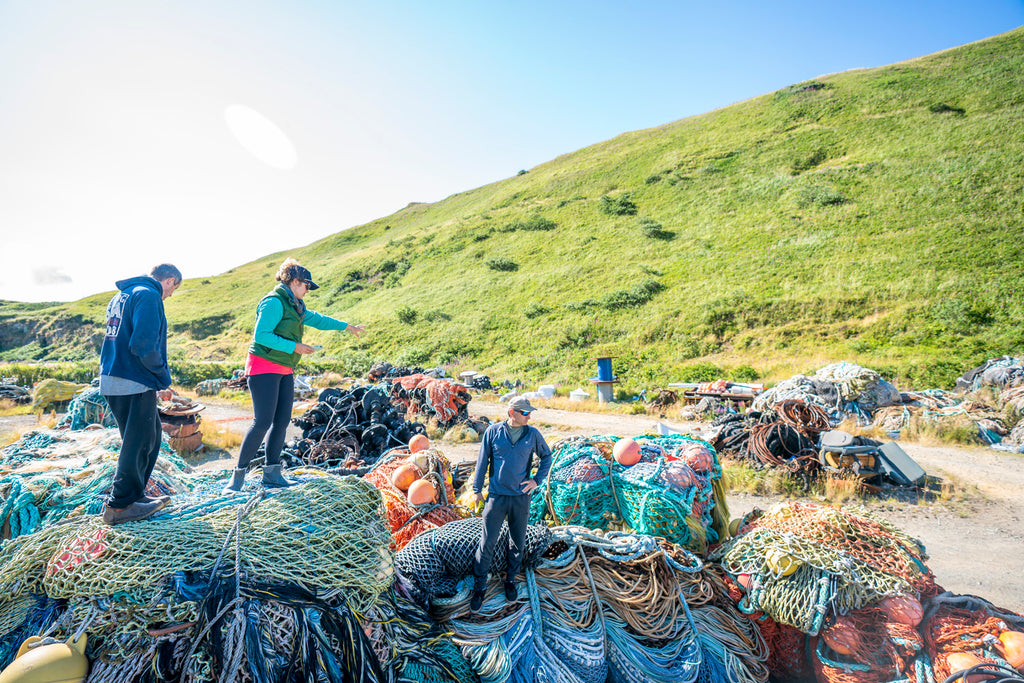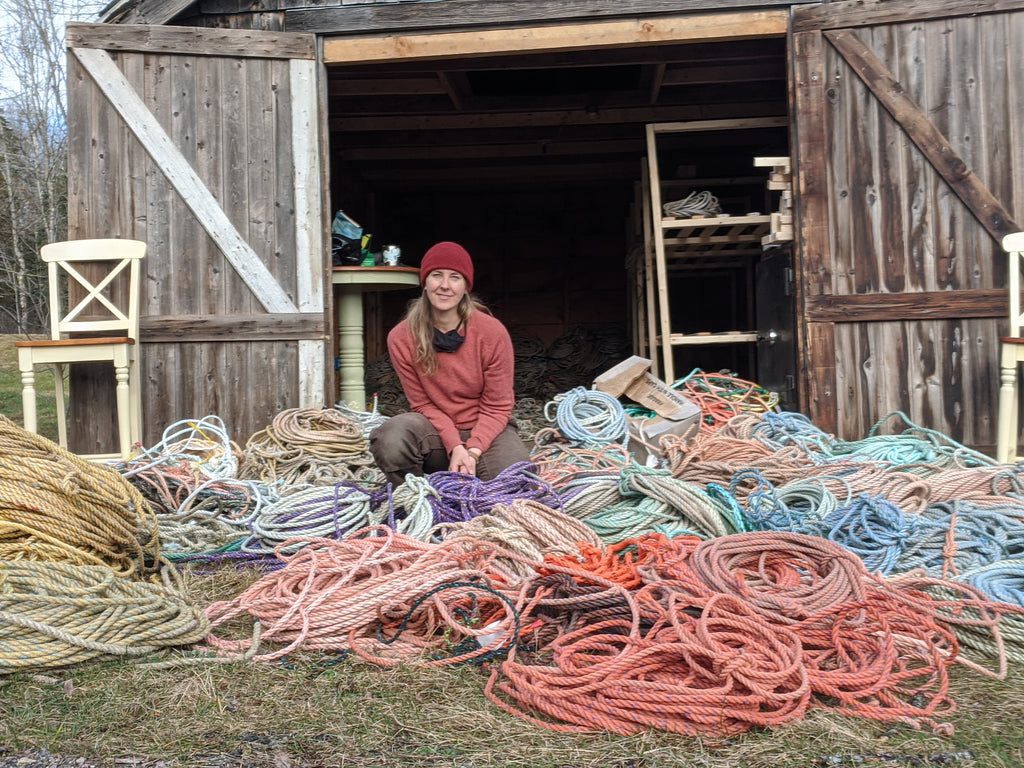Happy Earth Day! Today we're sharing a conversation with someone who inspires us with their work to keep our oceans clean. Nicole Baker is the founder of Net Your Problem, a program dedicated to upcycling fishing gear around the world. Nicole is a former North Pacific groundfish fisheries observer who became actively involved in looking for a way to recycle fishing nets from Unalaska and since 2015 has been working with commercial fisherman with nets to get rid of, and with recyclers who will take them!


SS: For those who don’t know, what is Net Your Problem and what is the mission behind it?
NB: Net Your Problem's mission is to engage a variety of stakeholders and partners to create an economically viable pathway to recycle end of life fishing gear, improve waste management, contribute to the circular economy, and reduce energy use and greenhouse gas emissions related to virgin plastic production. So basically we collect gear, but also try to create demand for the recycled plastic and promote the products that are made from fishing gear plastic. The reason we need to engage a variety of stakeholders is because the incentives to recycle fishing gear are sometimes upside down; If the landfill is free, it can be hard to charge for recycling - so we need to rally as many organizations (public, private, government, NGO) as we can to distribute the costs, while making a business case for why we should pay for recycling. Net Your Problem is set up as a for-profit business, not a non-profit, so we are working very hard to develop longterm waste management solutions for fishing gear, instead of spending our time writing grants to do a small project over just one year.

SS: How did you dream up this initiative? Tell us a little bit about yourself, getting started in Alaska as a fisheries observer, and some of the challenges and victories you’ve experienced with Net Your Problem since starting out.
NB: I have a masters degree in marine biology, and I was a fisheries observer in the pollock fleet for five years. I loved every minute of that job, and it gave me such great knowledge of the fishing gear used, and I built great relationships that have served me well growing my business. At the end of my last contract I saw an article about a prototype sneaker that was made by Adidas and Parley for the Oceans from recycled gillnets (and now I own a pair, even though they are made from recycled water bottles now). A lightbulb went off in my head that nets are made from plastic, and as such, I thought they should be recycled. I certainly knew where a lot of them were! I searched on and off for a few years for a recycling company that would take the nets, found one in Denmark and was off to the races! I feel such a sense of accomplishment every thousand pounds of gear we can divert from the landfill, and this is happening more often as fishermen find out about what we are doing and the recycling option that is available to them. This summer I'm pretty sure we are going to cross the 1 million pound mark!
But there are a lot of challenges obviously, I mentioned the free landfill earlier, and not everyone is willing to pay for recycling, or wants to spend extra time to prepare their gillnet the right way for recycling, or sort their crab line - so we have a lot of work to do trying to convince the industry that this is part of being sustainable - the biological status of their target stock is obviously important, but so is the sustainability of their operations, and just continuing to dump plastic gear in the landfill or storing it indefinitely isn't sustainable for the local communities. I know fishermen have a lot on their plate, but improving business operations in any way they can, such as reducing waste, and being more efficient will ultimately improve the overall sustainability of a fishery.


SS: How is the commercial fishing industry involved in your work and what should fishermen know to help keep the ocean clean?
NB: The commercial fishing industry is my best and only customer! When fishermen get a new net or new gear, they should make sure they reycle their old one! Fishermen are so important to the work that I do, its their choice to recycle that allows me to have the impact I have been able to have, and by disposing of their waste with me, can help us keep the ocean clean in the long run. By managing waste properly, we keep it out of the landfill, but also out of the marine and terrestrial environment. If you are reading this and wish you had a recycling option but currently don't, reach out to us and we will help you start one!

SS: What impact are you seeing from what Net Your Problem has already accomplished?
NB: As of writing this, we have been able to divert 971,000 LBS of gear from landfills and the environment. We have expanded from Alaska where I started to Washington, California and Maine and have big plans as far as collecting gear this summer. My teammate Sara from California manages a gear buy-back program for drift gillnet fishermen in California, and teammate Erin is building a program for recycling and reusing end of life lobster lines in Maine. There is a great reuse community in Maine, so we collect rope and sell it to artists at the moment - which means we don't even have to send it for recycling, it gets made into new products right in New England.


SS: What are some long-term goals you hope to see?
NB: Ideally, I would like every major fishing port in the US to have an option for recycling end of life gear. We make too much virgin plastic, so recycling as much plastic as we can and utilizing recycled plastic of any kind is so important these days. I think that such cool products can be made from trawl polyethylene, crab line polypropylene and nylon from gillnets and seines - and these products connect regular citizens to the working waterfronts and fishermen that used the gear, and really make people feel good about their purchases. So maybe someday we will make NYP branded products made from plastic we collect, and have them be useful in the fishing/maritime industry.

SS: How can people get involved in supporting your work and cleaning up their local coastlines?
NB: If you are a fishermen, recycle your gear with us! If you aren't, buy products that are made with recycled content, and we do have a contribute page on our website. We are not a non-profit, but can really make good use of contributions while we develop new collection schemes in new ports. We also participate in beach cleans as much as we can, but cleanup can only go so far - we need to manage waste properly to make sure it doesn't enter the environment in the first place. If you like hats, we also have some of those for sale on our website, the profit we make from those goes back into developing new recycling programs, and you can show off your interest in our mission. They are made from all recycled materials, obviously!
Get involved with Net Your Problem. Follow @netyourproblem on Instagram and Twitter. For questions for Nicole, contact nicole@netyourproblem.com.

